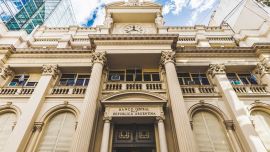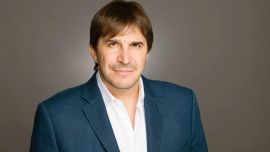Complete name: Sergio Tomás Massa
Date of birth: 28/04/1972
Place of birth: San Martín, Buenos Aires Province
Profession: lawyer
Political affiliation: Frente Renovador
Current public office: Economy minister
Previous public offices: national deputy, Tigre mayor, director of ANSES social security administration, Cabinet chief
Coalition/front: Unión por la Patria
Lawyer Sergio Massa, 51, has been Argentina’s economy minister since August, 2022. Prior to that he was Speaker of the lower house of Congress. He has been married to Malena Galmarini (who currently heads the AySA waterworks) since 2001 and they have two children, Milagros and Tomás.
Massa is one of the three main partners of the Peronist coalition which came to power in 2019 under the name of Frente de Todos and is now rebranded as Unión por la Patria. The other two are President Alberto Fernández and Vice-President Cristina Fernández de Kirchner, the latter a two-term former president and until recently the most powerful of the trio in political terms.
If Fernández de Kirchner represents the left within Peronism, Massa is more to the centre with his gifts for negotiation, dialogue and strategy seen as his strongest assets. He has good links with diverse political, business and trade union sectors, as well as contacts abroad.
Born to Italian immigrant parents in the Greater Buenos Aires district of San Martín where he was schooled, Massa has spent over half his life in politics in a career stretching back over 30 years – indeed such was his dedication to politics that he only completed his university studies in 2013, graduating as a lawyer from the University of Belgrano when aged over 40. The first stop in that career saw him joining the Unión de Centro Democrático liberal party. This brought him close to Carlos Menem, the Peronist president carrying out neoliberal policies in the last decade of the century, becoming Social Development secretary during his government.
Elected a Peronist deputy for Buenos Aires Province in 1999, he joined the government of Eduardo Duhalde after the 2001 crisis. Placed in charge of ANSES (Administración Nacional de la Seguridad Social) social security administration managing the pension system, where he claimed to have recouped the 13 percent lost to pensions during the 2001-2002 crisis, he remained in that post after Néstor Kirchner was elected president in 2003.
In 2007, Massa was elected to his first executive post: mayor of the northern Greater Buenos Aires district of Tigre but quickly moved on to become the Cabinet chief of Cristina Fernández de Kirchner between mid-2008 and mid-2009, replacing current President Fernández.
Distanced from Fernández de Kirchner in her second term, Massa formed his own party, the Frente Renovador, in 2013, trouncing the government in that year’s midterms. This encouraged him to run for the Presidency in 2015 but he finished third behind the Kirchnerite candidate Daniel Scioli in elections won by Mauricio Macri, topping 20 percent in the best performance by any candidate outside the two-party system.
Neither was his luck any better running for senator in the 2017 midterms. He redeveloped ties with Fernández de Kirchner, joining Frente de Todos in time for the 2019 elections won by Alberto Fernández. As Congress Speaker until moving to the Economy Ministry, he had plenty of opportunities to deploy his gifts for consensus-seeking.
His admirers consider him a pragmatist who can dialogue with representatives of the most diverse sectors, taking on the challenge of commanding the Economy Ministry at a highly complex time with pessimistic perspectives, especially with a drought of record dimensions hitting a country which has always been an agricultural heavyweight. .
But his critics run him down as somebody less than trustworthy who changes his stances and allies too easily. One of the doubts surrounding his presidential bid is whether, in the event of a triumph, he would be able to amalgamate a divided Peronism, especially after the Alberto Fernández experience.
On the other side of the fence to Milei, Unión por la Patria proposes a stronger state. According to its electoral platform, its government would focus on the recovery of the domestic market and looking after the most vulnerable sectors, also calling for a broad national agreement with other political parties and social sectors. Unlike La Libertad Avanza, the ruling coalition is socially progressive, defending human and sexual rights such as legal abortion.
Massa’s running-mate is Agustín Rossi, the current Cabinet chief and a veteran Peronist.




















Comments